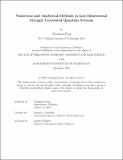Numerical and Analytical Methods in Low-Dimensional Strongly Correlated Quantum Systems
Author(s)
Peng, Changnan
DownloadThesis PDF (8.612Mb)
Advisor
Metlitski, Maxim A.
Terms of use
Metadata
Show full item recordAbstract
The study of low-dimensional strongly correlated quantum systems lies at the intersection of intricate theoretical models and practical numerical methods, offering deep insights into condensed matter physics. This thesis explores the application of various numerical and analytical methods to these systems. It addresses universal behaviors and phase transitions, exemplified by the phenomenon of multiversality. Specifically, the transition from a 1D Luttinger liquid to a charge density wave insulator, characterized by partly Kosterlitz-Thouless transition and partly Ising transition, is analyzed using both analytical renormalization group calculations and numerical density matrix renormalization group simulations. Additionally, the thesis introduces a statistical smoothing spline method to pinpoint transition points systematically. The work extends to quantum dynamics, presenting a generic theoretical framework for analyzing quantum-classical adiabatic dynamics with learning algorithms. A provably efficient adiabatic learning (PEAL) algorithm with favorable scaling properties is developed. The algorithm is numerically validated on the 1D Holstein model, demonstrating its precision in predicting dynamics. Furthermore, the thesis derives a Hamiltonian lattice formulation for the 2+1D compact Maxwell-Chern-Simons theory, providing an analytical solution that aligns with continuum theories and facilitating future numerical applications. Through these explorations, the thesis underscores the complementary roles of numerical and analytical methods in advancing the understanding of complex quantum systems.
Date issued
2024-09Department
Massachusetts Institute of Technology. Department of PhysicsPublisher
Massachusetts Institute of Technology